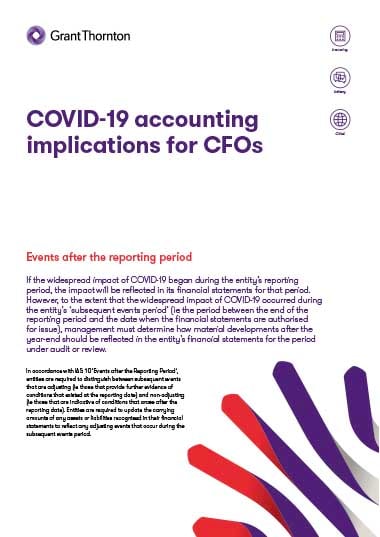-
Sector Focus
We specialise in the investment management industry offering audit, assurance, tax and corporate recovery and liquidation services.
-
Personal Tax Services
There are many tax rules that can affect you personally and therefore which will have an impact on your personal wealth.
-
QI Compliance
Qualified Intermediaries (QI) have to take action now to perform a Certification to the Internal Revenue Service (IRS).
-
Download our tax brochures
The tax teams at Grant Thornton aim to provide the Channel Islands with a premier tax advisory service both to private clients and the business community including the investment management industry.
-
Jersey Tax Return
A secure sign in page to file Jersey Tax Returns through the Grant Thornton tax portal.
-
ESG
ESG can either be seen as a risk management tool or an opportunity, either way it is imperative to your business, whatever your size and whether you are listed or not.
-
Professional Services
Business and accounting support for professional services
-
Finance Industry
We work with a broad range of clients and their financial stakeholders, from entrepreneurs in the early days to fast growing and established businesses to public companies competing in global markets.
-
Local Businesses
Businesses come in many shapes and sizes – from innovative start-ups to long-established local businesses. But however large or small your business, the chances are you face similar challenges.
-
Corporate Insolvency
Our corporate investigation, Guernsey liquidation and recovery teams focus on identifying and resolving issues affecting profitability, protecting enterprise value and facilitating a full recovery where possible.
-
Corporate Simplification
Redundant corporate entities can over complicate group structures and waste thousands of pounds in unnecessary costs each year. 46% of the c.15,500 companies controlled by the FTSE100 are dormant and it is estimated that the average cost of administering dormant companies is between £3,500 and £5,000 per company, per year.
-
Debt Advisory
Our Debt Advisory team provides commercial and financial debt advice to corporate entities and public sector bodies in a range of sectors. Our engagements include advice on stand-alone transactions and solutions or as part of an integrated business plan, in both the project and corporate arenas.
-
Exit Strategy Services
We offer a tailored methodology designed to enable a company to be reviewed in a group context to assess ways to maximise its value.
-
Financial Restructuring
For companies challenged by under-performance we work with management teams, shareholders, lenders and other stakeholders to implement financial restructuring solutions creating a stable platform for business turnaround.
-
Strategic performance reviews
Strategic performance reviews analyse the key drivers of performance improvement. Our specialists utilise a framework to evaluate financial and operational options and to identify solutions for businesses and their stakeholders.
If the widespread impact of COVID-19 began during the entity’s reporting period, the impact will be reflected in its financial statements for that period. However, to the extent that the widespread impact of COVID-19 occurred during the entity’s ‘subsequent events period’ (ie the period between the end of the reporting period and the date when the financial statements are authorised for issue), management must determine how material developments after the year-end should be reflected in the entity’s financial statements for the period under audit or review.
In accordance with IAS 10 ‘Events after the Reporting Period’, entities are required to distinguish between subsequent events that are adjusting (ie those that provide further evidence of conditions that existed at the reporting date) and non-adjusting (ie those that are indicative of conditions that arose after the reporting date). Entities are required to update the carrying amounts of any assets or liabilities recognised in their financial statements to reflect any adjusting events that occur during the subsequent events period.
Download 'Events after the reporting period' [ 139 kb ]
When does COVID-19 not become an adjusting event?
In our view, the impact of COVID-19 would be a non-adjusting subsequent event for reporting periods ended on or before 31 December 2019. Consequently, there would be no impact on the recognition and measurement of assets and liabilities in an entity’s financial statements. Although cases of the virus in Wuhan City, China were reported to the World Health Organisation (WHO) on 31 December 2019, there was little confirmed evidence of human-to-human transmission at that time and the WHO did not declare the outbreak to be a public health emergency of international concern until 31 January 2020.
As such, it is presumed that the significant development and spread of COVID-19 did not take place until January 2020. Financial statements for an entity with a reporting period ending on or before 31 December 2019 should only reflect the conditions that existed at 31 December 2019 and must therefore exclude the significant effects of the COVID-19 pandemic.
However, all reporting entities should determine whether or not they should make additional disclosures to describe the impacts of the outbreak in the subsequent events period. Generally, disclosure should be made of those events during the subsequent events period that do not relate to conditions that existed at the date of the financial statements but cause significant changes to assets or liabilities in the subsequent period and either will, or may, have a significant effect on the future operations of the entity.
For material non-adjusting events, IAS 10 stipulates an entity must disclose (a) a description of the nature of the event; and (b) an estimate of the financial effect, or a statement that such an estimate cannot be made.
Examples of non-adjusting events that would generally result in disclosure include:
- management’s plans to deal with the effects of the COVID-19 outbreak and whether there is material uncertainty over the entity’s ability to continue as a going concern
- breaches of covenants, waivers or modifications of contractual terms in lending arrangements
- supply chain disruptions
- the assessment of certain purchase or sale agreements as onerous contracts
- announcing a plan to discontinue an operation
- announcing, or commencing the implementation of, a major restructuring or downsizing (temporarily or permanently)
- declines in the fair value of investments held after the reporting period (eg pension plan investments)
- abnormally large changes in asset prices or foreign exchange rates, and
- entering into significant commitments or contingencies, such as issuing significant guarantees to related parties.
All disclosures should be entity-specific and include information relevant to their circumstances. The following are some examples for some potential non-adjusting events for 31 December 2019 financial statements:





